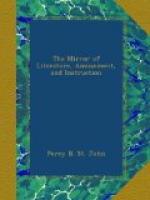When the sea is calm, whole fleets of these Nautili may be seen diverting themselves; but when a storm rises, or they are disturbed, they draw in their legs, take in as much water as makes them specifically heavier, than that in which they float, and then sink to the bottom. When they rise again they void this water by numerous holes, of which their legs are full. The other species of Nautilus, whose shell is thick, never quits that habitation. The shells of both varieties are exceedingly beautiful when polished, and produce high prices among Conchologists.
It is easy to conceive that the ingenious habits of this wonderful creature may have suggested to man the power of sailing upon the sea, and of the various apparatus by which he effects that object. The whole creation abounds with similar instances of Nature ministering to the proud purposes of art: one of them, the origin of the Gothic Arch from the “high o’erarching groves,” is mentioned by Warburton, in his Divine Legation, and is a sublime lesson for besotted man.
[8] Magazine of Natural History, No.1.
* * * * *
THE SELECTOR;
AND
LITERARY NOTICES OF NEW WORKS.
* * * * *
VIDOCQ.
[We have abridged one of the most striking chapters in the very extraordinary history of Vidocq; premising that the interest of the adventure will compensate for the space it here occupies.]
A short time before the first invasion (1814), M. Senard, one of the richest jewellers of the Palais Royal, having gone to pay a visit to his friend the Cure of Livry, found him in one of those perplexities which are generally caused by the approach of our good friends the enemy. He was anxious to secrete from the rapacity of the cossacks first the consecrated vessels, and then his own little treasures. After much hesitation, although in his situation he must have been used to interments, Monsieur le Cure decided on burying the objects which he was anxious to save, and M. Senard, who, like the other gossips and misers, imagined that Paris would be given over to pillage, determined to cover up, in a similar way, the most




